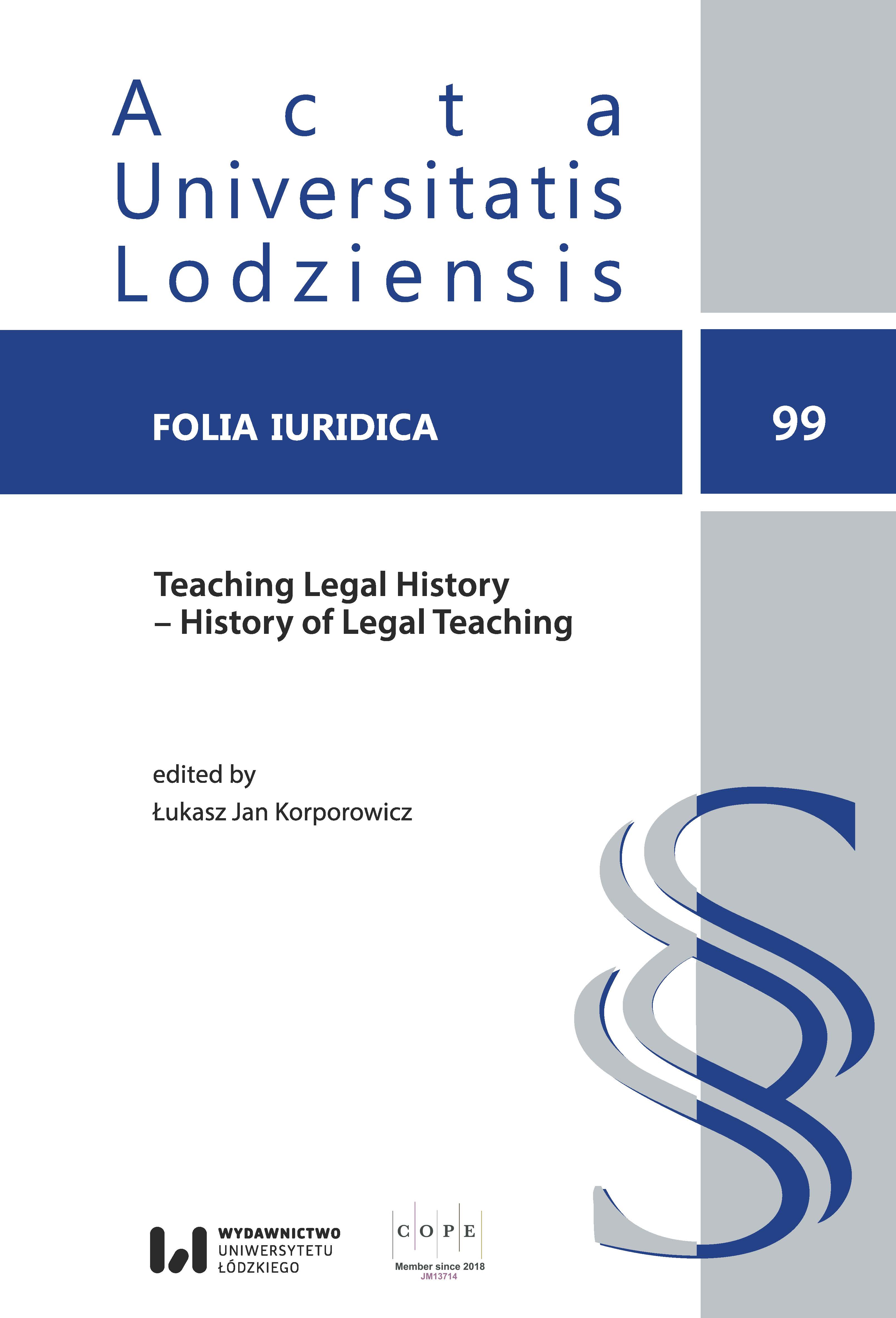Myśleć jak prawnik: przypadek prawa rzymskiego
DOI:
https://doi.org/10.18778/0208-6069.99.12Słowa kluczowe:
prawo rzymskie, doktryna prawa, amerykański realizm prawniczy, prawo i społeczeństwo, badania prawno-społeczneAbstrakt
Celem tego opracowania jest ogólne przedstawienie niektórych ostatnich trendów, które pojawiły się w związku z nauką i nauczaniem prawa rzymskiego. Są one dostrzegalne w szerszym kontekście roli oraz funkcjonowania nauczania prawa rzymskiego na wydziałach prawa w XX wieku. Ponadto, wskazuje się w tym opracowaniu, że tendencje dotyczące badań nad rzymskimi źródłami prawa, które ujawniły się w amerykańskich szkołach prawniczych, mają potencjał umożliwiający wzbogacenie dyscypliny oraz mogą pozwolić na postawienie nowych pytań dotyczących prawa rzymskiego.
Pobrania
Bibliografia
Babusiaux, Ulrike. 2016. “The Future of Legal History: Roman Law.” The American Journal of Legal History 56(1): 6–11. https://doi.org/10.1093/ajlh/njv008
Google Scholar
DOI: https://doi.org/10.1093/ajlh/njv008
Beiser, Frederick C. 2015. The German Historicist Tradition. Oxford: Oxford University Press.
Google Scholar
Bryen, Ari Z. 2014. “Law in Many Pieces.” Classical Philology Classical Philology 109(4): 346–365. https://doi.org/10.1086/677860
Google Scholar
DOI: https://doi.org/10.1086/677860
Calavita, Kitty. 2010. Invitation to Law & Society: An Introduction to the Study of Real Law. Chicago: University of Chicago Press. https://doi.org/10.7208/chicago/9780226089980.001.0001
Google Scholar
DOI: https://doi.org/10.7208/chicago/9780226089980.001.0001
Coing, Helmut. 1973. “Roman law as ius-commune on continent.” Law Quarterly Review 89(356): 505–517.
Google Scholar
Dubber, Markus D. Christopher Tomlins. Eds. 2018. The Oxford Handbook of Legal History. New York: Oxford University Press. https://doi.org/10.1093/oxfordhb/9780198794356.001.0001
Google Scholar
DOI: https://doi.org/10.1093/oxfordhb/9780198794356.001.0001
Frier, Bruce W. 1989–1990. “Autonomy of Law and the Origins of the Legal Profession.” Cardozo Law Review 11(2): 259–286.
Google Scholar
Giaro, Tomasz. 1993. “Europa und das Pandektenrecht.” Rechtshistorisches Journal 12: 326–345.
Google Scholar
Haferkamp, Hans-Peter. Klaus Luig. Tilman Repgen. 2017. Wie pandektistisch war die Pandektistik? Symposium aus Anlass des 80. Geburtstags von Klaus Luig am 11. September 2015. Tübingen: Mohr Siebeck. https://doi.org/10.1628/978-3-16-155459-9
Google Scholar
DOI: https://doi.org/10.1628/978-3-16-155459-9
Hoeflich, Michael H. 1984. “Roman and Civil Law in American Legal Education and Research Prior to 1930: A Preliminary Survey A Symposium in Legal History: American Legal History: Revisionist Viewpoints.” University of Illinois Law Review 3: 719–738.
Google Scholar
Jhering, Rudolf von. 1985. “In the Heaven for Legal Concepts: A Fantasy.” Temple Law Quarterly 58: 799–842.
Google Scholar
Letwin, Shirley Robin. 2009. On the History of the Idea of Law. Cambridge: Cambridge University Press.
Google Scholar
Osler, Douglas J. 2007. “The Fantasy Men.” Rechtsgeschichte – Legal History 10: 169–192. https://doi.org/10.12946/rg10/169-192
Google Scholar
DOI: https://doi.org/10.12946/rg10/169-192
Plessis, Paul du. 2019. “A Festschrift for Bruce Frier on Ancient Law and Society.” Journal of Roman Archaeology 32: 648–655. https://doi.org/10.1017/S1047759419000485
Google Scholar
DOI: https://doi.org/10.1017/S1047759419000485
Pölönen, Janne. 2006. “The Case for a Sociology of Roman Law.” In Law and Sociology. Edited by Michael Freeman. 398–408. Oxford: Oxford University Press.
Google Scholar
DOI: https://doi.org/10.1093/acprof:oso/9780199282548.003.0022
Schiller, A. Arthur. 1978. Roman Law Mechanisms of Development. The Hague–New York: Mouton. https://doi.org/10.1515/9783110807196
Google Scholar
DOI: https://doi.org/10.1515/9783110807196
Stein, Peter. 1999. Roman Law in European History. New York: Cambridge University Press. https://doi.org/10.1017/CBO9780511814723
Google Scholar
DOI: https://doi.org/10.1017/CBO9780511814723
Stein, Peter G. 2007. “The Roman Jurists’ Conception of Law.” In A Treatise of Legal Philosophy and General Jurisprudence. Edited by Andrea Errera, Andrea Padovani, Kenneth Pennington, Peter Stein. Vol. 7: 1–30. Dordrecht: Springer Netherlands. https://doi.org/10.1007/978-94-017-9880-8_1
Google Scholar
DOI: https://doi.org/10.1007/978-94-017-9880-8_1
Van Hoecke, M. François Ost. 1998. “Legal Doctrine in Crisis: Towards a European Legal Science.” Legal Studies: The Journal of the Society of Public Teachers of Law 18(2): 197–215. https://doi.org/10.1111/j.1748-121X.1998.tb00013.x
Google Scholar
DOI: https://doi.org/10.1111/j.1748-121X.1998.tb00013.x
Watson, Alan. 1977. Society and Legal Change. Edinburgh: Scottish Academic Press.
Google Scholar
Watson, Alan. 1983. “Legal Change: Sources of Law and Legal Culture.” University of Pennsylvania Law Review 131(5): 1121–1157. https://doi.org/10.2307/3311936
Google Scholar
DOI: https://doi.org/10.2307/3311936
Winkel, Laurens. 2015. “Roman Law and Its Intellectual Context.” In The Cambridge Companion to Roman Law. Edited by David Johnston. 9–22. New York: Cambridge University Press. https://doi.org/10.1017/CCO9781139034401.003
Google Scholar
DOI: https://doi.org/10.1017/CCO9781139034401.003
Zimmermann, Reinhard. 1996. “Savigny’s Legacy. Legal History, Comparative Law, and the Emergence of a European Legal Science.” The Law Quarterly Review 112: 576–605.
Google Scholar
Pobrania
Opublikowane
Jak cytować
Numer
Dział
Licencja

Utwór dostępny jest na licencji Creative Commons Uznanie autorstwa – Użycie niekomercyjne – Bez utworów zależnych 4.0 Międzynarodowe.














